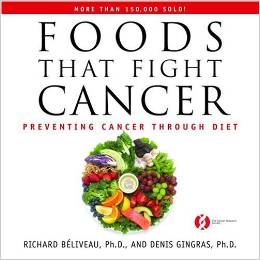Get the book at: http://amzn.com/0771011350
En français: Les aliments contre le cancer
Excerpt. © Reprinted by permission. All rights reserved.
Cancer prevention facts to add to your diet
- Approximately one third of all cancers are directly related to diet.
- A diet containing three or four weekly servings of broccoli, nothing too excessive, was shown to be sufficient to protect individuals from colon polyps.
- Cruciferous vegetables (brussel sprouts, broccoli, cabbage, cauliflower, kale) should be lightly cooked and thoroughly chewed when eaten in order to fully benefit from their anti-cancer potential. Chewing releases the active molecules.
- Freshly crushed garlic is by far the best source of anti-cancer compounds and should be preferred over supplements.
- The key to benefiting from the anti-cancer effects of soy lies in consuming about 50 grams per day of the whole food, such as raw (edamame) or dry roasted soybeans. Supplements containing isoflavones are not an acceptable alternative to the whole food and should be avoided.
- Colon cancer appears to be one of the cancers on which curcumin may have the greatest positive impact. The daily addition of a teaspoon of turmeric to soups, salad dressings, or pasta dishes is a simple way of providing curcumin intake sufficient to prevent the development if cancer.
- Green Tea contains large amounts of catechins, compounds that boast many anti-cancer properties. To maximize the preventative effects afforded by tea, select Japanese green teas, allow for an eight-to-ten minute brewing period and always drink freshly brewed tea, and avoiding Thermoses.
- Eating cranberries should be preferred over drinking cranberry juice.
- The best way to increase omega-3 levels in diet is to eat fatty fish (wild salmon, sardines, and mackerel) once or twice a week or add one tablespoon of freshly-milled flax seeds to your breakfast cereal.
- Eating two tomato sauce-based meals per week may lower your risk of developing prostate cancer by up to 25%.
- Citrus fruits are essential foods in cancer prevention: for their capacity to act directly on cancerous cells as well as their potential for enhancing the anti-cancer effects of other phytochemical compounds present in diet.
- The resveratrol present in red wine possesses powerful anti-cancer activity which may be responsible for the beneficial effects of wine on the prevention of certain cancers. Grape juice and cranberry juice contains resveratrol but at levels ten times less than red wine.
- The daily consumption of 40 grams of dark chocolate (chocolate containing 70% cocoa mass) may have definite health benefits and should replace or reduce that of sugar- and fat-filled candies with no phytochemical content.
- Many herbs and spices used as seasonings, in particular ginger contain large quantities of molecules that act as anti-inflammatory compounds, which also reduce the risks of developing certain chronic diseases.
- Instead of replacing butter with margarine, use olive oil as much as possible as a source of dietary fat; you will benefit from its healthful lipids knowing that it also possesses anti-cancer properties of its own.
This is just a summary. It’s good to read the book to get a better understanding of why all these foods have an impact on cancer – when we understand better, we are more efficient at adapting our diet correctly.
PS: If you already have cancer, ask your doctor first – but make sure your doctor is open to “global therapy”, ie modern medicine + diet + alternative means.
PS2: These foods will not cure your cancer alone – modern medicine is very efficient in curing cancer (more than 50% of cancers can be cured and it’s improving); but these foods will significantly improve your chances of success.
Vincent



